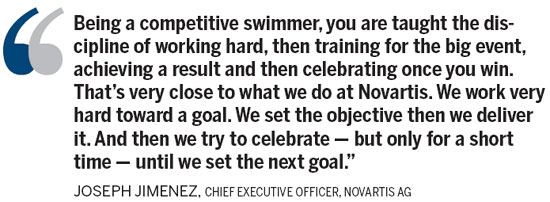Pharma boss likes a fit lifestyle
|
A laboratory in China Novartis Institutes for BioMedical Research in Shanghai, The facility is Switzerland-based Novartis AG's third-largest research and development center in the world. [Photo / Provided to China Daily] |

CEO likens sport discipline to rigor of global business
As a former competitive swimmer, the dedication Joseph Jimenez had to display on a daily basis helps in his current position as chief executive officer of pharmaceutical giant Novartis AG.
"Being a competitive swimmer, you are taught the discipline of working hard, then training for the big event, achieving a result and then celebrating once you win," he said. "That's very close to what we do at Novartis. We work very hard toward a goal. We set the objective then we deliver it. And then we try to celebrate - but only for a short time - until we set the next goal."
In addition, strong mettle, courage and consistency are characteristics required in both top-level swimming and business.
Upon joining Novartis in 2007 as division head of the consumer health unit - the over-the-counter drugs business - Jimenez had no scientific or pharmaceutical background but did possess rich experience in the consumer goods industry and business degrees from Stanford University and University of California, Berkeley.
He discovered a fellow employee with a science background who was good at communicating clearly on the topic of complicated pharmaceuticals and invited him to his office on many early mornings to go over in detail every drug that Switzerland-based Novartis produced: the biology of the disease each one treated and the mechanism through which they worked, just like morning training in the world of sports.
"I needed to win the respect of the company's scientists and, ultimately, I had to understand the products so that we, together, could make some key decisions," he said.
In 2007, Jimenez was appointed to lead the pharmaceuticals division - a core business of Novartis engaged in innovative drugs. At the time the company was facing the challenge of stricter regulations in the United States and Europe and medical policies in various nations were changing. The Novartis board wanted to bring a fresh eye to the issues.
Because of his success in leading the transformation of the pharmaceutical portfolio to balance mass market and specialty products and significantly increasing the percentage of sales from newly launched products, Jimenez was promoted to the CEO position in 2010. His job was to manage the medical regimes of five business units - pharmaceuticals, eye care, generics, vaccines and diagnostics, as well as over-the-counter drugs and animal health.
At the moment Jimenez and the industry in general are facing a trio of huge challenges: the expiry of patents on certain highly popular drugs, price-cutting pressure from governments around the world and the global economic slowdown.
What is known in the industry as the "patent cliff" means after patent expiration of a blockbuster drug, other companies can produce a generic with the same essential chemicals at a much lower price to capture a high market percentage. Blockbuster drugs are defined as medicines that provide revenues of more than $1 billion sales per year. High profits are required to pay for the high costs of research and development required by the pharmaceutical industry.
For more than a decade, the top-selling Novartis product had been Diovan, an anti-hypertensive medicine. People who need it should take it every day. In 2011 and 2012, the patent on Diovan in Europe and the United States expired, and around a dozen drugmakers began manufacturing generic versions at much lower prices. In 2007, the Novartis pharmaceuticals division as a whole had revenues of $24 billion, of which $5 billion came from sales of Diovan.
Novartis is not alone in facing the issue. The patent for US-based Pfizer Inc's Lipitor, the best-selling prescription drug in history, ended in 2011. Analysts said Lipitor sales will decline from about $11 billion in 2009 and 2010 to just above $3 billion in 2015.
IMS Health, a healthcare information provider, forecasts that by 2016 patent expirations will have caused a loss of $106 billion in sales from branded drugs over the previous five years, with the heaviest burdens occurring in 2012 and 2013.
To deal with the problem, innovation-centered drugmakers are taking various measures, such as further enhancing their R&D strengths and expanding their own generic business. US drugmaker Eli Lilly and Co's Chairman, President and CEO John C. Lechleiter said his company would continue to put 20 percent of its sales into R&D in the coming years. Pfizer announced a $545 million generic joint venture deal with Zhejiang Hisun Pharma last February, saying that it wants to keep pursuing "opportunities" in China and India to expand its portfolio of generic drugs.


























